#genre: palestinian literature
Explore tagged Tumblr posts
Text
A sweeping and lyrical novel that follows a young Palestinian refugee as she slowly becomes radicalized while searching for a better life for her family throughout the Middle East, for readers of international literary bestsellers including Washington Black, My Sister, The Serial Killer, and Her Body and Other Parties. As Nahr sits, locked away in solitary confinement, she spends her days reflecting on the dramatic events that landed her in prison in a country she barely knows. Born in Kuwait in the 70s to Palestinian refugees, she dreamed of falling in love with the perfect man, raising children, and possibly opening her own beauty salon. Instead, the man she thinks she loves jilts her after a brief marriage, her family teeters on the brink of poverty, she’s forced to prostitute herself, and the US invasion of Iraq makes her a refugee, as her parents had been. After trekking through another temporary home in Jordan, she lands in Palestine, where she finally makes a home, falls in love, and her destiny unfolds under Israeli occupation.
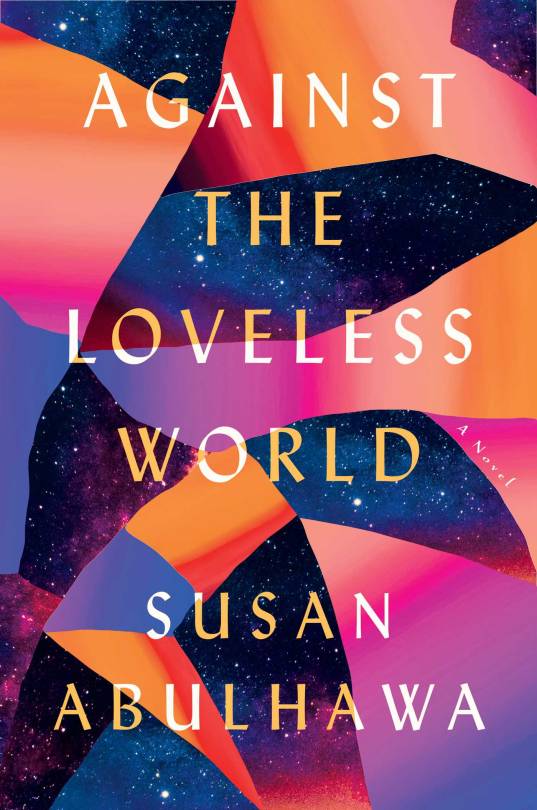
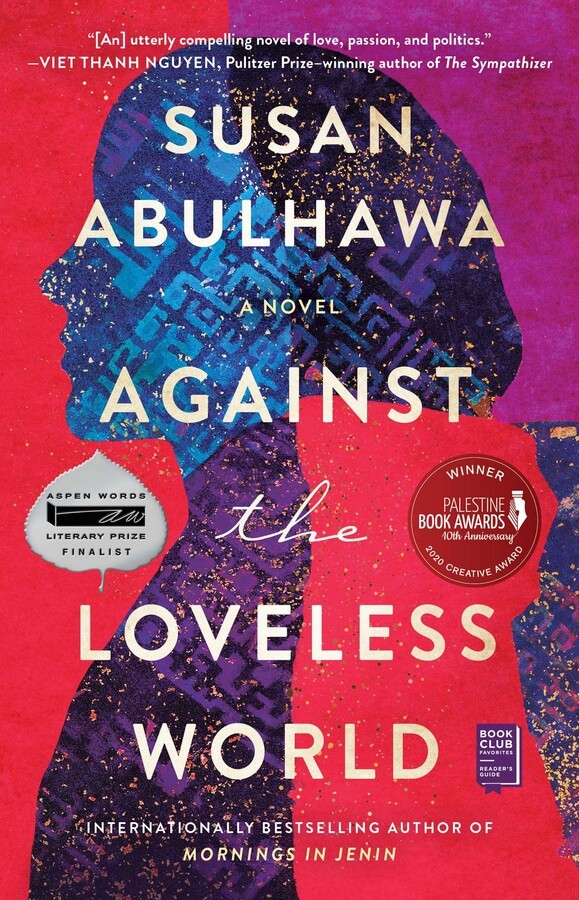
#book: against the loveless world#author: susan abulhawa#genre: historical fiction#genre: literary#genre: contemporary#genre: palestinian literature#year: 2010s
63 notes
·
View notes
Text
[Video description: Dated black and white video of an interview between a man off-screen who speaks in an upper-crust English accent and a handsome brown man in his thirties seated at a table. He is lean with short curly dark hair, a very sixties moustache, and wearing a casual shirt with an open collar. The camera is zoomed in on him, leaning forward on his elbows, head low and tilted towards the interviewer, brow furrowed, and an intense gaze that flicks down at the table after each question in careful contemplation. He speaks with an Arab accent. The timer of the video recording ticks away at the top left of the frame.
Transcript:
Interviewer: "Why won't your organisation engage in peace talks with the Israelis?"
Ghassan Kanafani: "You don't mean exactly peace talks. You mean capitulation. Surrendering."
Interviewer: "Why not just talk?"
Ghassan: "Talk to whom?"
Interviewer: "Talk to the Israeli leaders."
Ghassan: "That's the kind of conversation between the sword and the neck, you mean."
Interviewer: "Well, if there's no swords or guns in the room you could still talk."
Ghassan: "No. I have never seen any talk between a colonialist case and a national liberation movement."
Interviewer: "But despite this, why not talk?"
Ghassan: "Talk about what?"
Interviewer: "Talk about the possibility of not fighting."
Ghassan: "Not fighting for what?"
Interviewer: "Not fighting at all, no matter what for."
Ghassan: "People usually fight for something, and they stop fighting for something so you can't even tell me speak about what—"
Interviewer: "—Stop fighting—"
Ghassan: "—Talk about stop fighting why?"
Interviewer: "Talk to stop fighting to stop the death and the misery, the destruction, the pain."
Ghassan: "The misery and the pain and the destruction and the death for whom?"
Interviewer: "Of Palestinians, of Israelis, of Arabs."
Ghassan: "Of the Palestinian people who are uprooted, thrown in the camps, living in starvation, killed for twenty years and forbidden to use even the name Palestinian?"
Interviewer: "Better that way than dead though."
Ghassan: "Maybe to you, but to us, it's not. To us, to liberate our country, to have dignity, to have respect, to have our mere human rights is something as essential as life itself."
Ghassan Kanafani is one of the heroes of the Palestinian liberation and celebrated in the canon of modern Arab literature. Forced out of his home with his family during the Nakba in 1948 at the age of ten, the shame of their surrender to Zionists moved him to devote his life to Arab nationalism, Marxist movements and Palestinian liberation through his career as a newspaper editor, journalist, novellist and non-combatant member of the armed resistance group Popular Front for the Liberation of Palestine. He coined the term "resistance literature" for the genre of his writing, that came to be instrumental in shaping the Palestinian national identity and ideology of its resistance. In 1972, he and his 17 year old niece were murdered in a car bomb by Mossad.
His obituary read:
"He was a commando who never fired a gun, whose weapon was a ball-point pen, and his arena the newspaper pages."
#i absolutely love the way he turned each question back at the interviewer#highlighting how every one is a vague and meaningless platitude#taking control of the interview and never losing it no matter how stupid or unwilling to engage with the issue the interviewer is#it's a masterclass in communications#his most famous book of short stories 'Men in the Sun' is in my gdrive linked in my pinned#ghassan kanafani#free palestine#glory to the martyrs#glory to the resistance#palestinian writers#palestinian liberation#palestinian history#knee of huss
235 notes
·
View notes
Text
Intro post!
Heyos everyone, I'm Cally (she/her), and this is a dump/blog (?) of my writings, two cents, possibly memes and my feral fandom and sapphic side here.
So here are my namecards:
Fandoms (current/used to be in there/knows a bit and vibing):
80% of the MCU but mostly in Agatha All Along and Loki, PJO, MCGA, Iron Widow, Good Omens, Sandman, Wicked, Wednesday, ATLA, TLOK, One Punch Man, Haikyuu, Demon Slayer, Violet Evergarden, think that's it-
If Shakespearean and Austenian stuffs are counted as fandoms, there's Hamlet, Macbeth, Measure for Measure, Merchant of Venice, and Pride and Prejudice
Special interests
Writing a whole range of stuff 😈
Lots of character building (if I'm drunk I may or may not dump some of my OCs here)
Neurodivergence because I love learning stuff on ADHD and autism and neurospicy ppl 🙂↕️
Literature, but for now I mostly studied Shakespeare and Austen, but I have read a bit of Kafka and Poe and even Ocean Vuong so yes
Pre-Raphaelite and classical paintings because YouTube shorts have me entranced-
Mythology, and I'm somewhat biased to Norse myths but I'm still learning about Classics in Greek plays (screeches in Ne Zha movies after a while)
Horoscopes and personality typings (MBTI/enneagram) once in a while
Anything metaphysical and magical, a bit of witchcraft like tarots (though I don't practice), or even religion
Stuff I write
More poems than short stories because they're easier to write, and stuff like contrapuntal poems/twin cinemas 😈
A few of my poems are also inspired by vivid styles of those like Plath and even Ocean Vuong sometimes so yay
Lots of character building that's inspired by stuff I read and watch and even by existing myths and religion
Short stories and even flash fiction
Snippets of things in play format even though I'm not much of a playwright
A bit of Shakespearean English if I can 🔥
In terms of genre I gravitate to fantasy mainly, if I'm very pissed I can whip out some horror fantasy, but majority of the times it's more of cozy fantasy bordering on magical realism, and I've done slice-of-life settings as well as satire and a bit of sci-fi
My poems tend to be more romantic but that's not my main alley
Currently trying to write a lot more gay stuff because bi-
I also write about what I observe from news outlets and videos from Palestine and I write Pro-Palestinian poems as a form of advocacy, while also shining the light once in a while on others who are suffering like Lebanon and Ukraine and Sudan etc
I also have a few poems that express struggles and everyday life of mentally ill people whether we know it or not as a form of raising awareness as well
And yes of course I will write fanpoetry here (cough Agathario-)
Writers I pray to for guidance because they're too good and national treasures
Jane Austen, Elizabeth Jennings, Ocean Vuong, Xiran Jay Zhao, Shakespeare, Jac Schaeffer, Sylvia Plath, Franz Kafka (obviously not in order)
Current/recently finished books
Iron Widow by Xiran Jay Zhao, The White Book by Han Kang, Nightly Sky with Exist Wounds by Ocean Vuong, Emma by Jane Austen, The Midnight Library by Matt Haig
Current listens on loop
Bardcore/dramatic violin renditions of Running Up That Hill, Runaway by Aurora, Me and the Devil by Soap and Skin, Viva La Vida Nightcore songs, Defying Gravity from Wicked (it's the only song from Wicked I listen to don't kill me 😅)
TRIGGER WARNING TAGS
Will sometimes write stuff that are emotionally and mentally triggering like su*c*de and implied SA even though I never experienced these before, but I will be careful in not being too explicit, as well as gory violence because horror fantasy, nonetheless there will be relevant TWs put when necessary and please feedback politely if you find a piece of writing that's genuinely triggering but I didn't realise
I will also likely write horny and erotic things here so uh get ready I guess
If you are someone who is a hypocrite or do not subscribe to my values of being Pro-Palestinian, in solidarity with the neurodivergent, LGBTQIA+ communities and racial minorities and you're an evil or brainwashed hater or defender of moral plagues in the world or subscribe to AI taking over the jobs of artists, you won't just get blocked you will face a wrath from me that will make the circles of hell a paltry playground, mark my words-
Socials
IG: sh_ttysoliloquy
Substack: studiesinsoliloquys
Also because I like the word soliloquy and now I'm basing my platforms on this because it's a decent word
Personality labels (and miscellaneous)
INFP, enneagram 4 (sx/not sure sp or so), Pisces Sun and Scorpio Moon, loves the number 7 and 12 and somehow likes the High Priestess tarot card best and the Perthro rune best because Hearthstone from MCGA
Final words before strapping you guys to the rollercoaster
I'm super forgetful because object impermanence so expect inconsistency but also expect some feral shit here
Bad grammar even though I speak English more than my mother tongue
Being super good in sarcasm while sometimes taking things too literally is a thing but I'll try to remember to do tone tags like /s or /lh when I can
I reblog too many things
Yeah I think that's it sillysoliloquyshits signing off~
(cue the screaming as you bolt backwards into the void)
Donation links docs:
This is a compiled list of Palestinians fundraisers from both IG and Tumblr, along with Operation Olive Branch's spreadsheet of links (all vetted from there) and Xiran Jay Zhao's LINKTREE that has links to various donations campaigns not just for Palestinians.
I'll keep adding families if they are vetted or approach me so please open this document and help those families who's names are bolded or underlined as well because they tend to have the least funds!
#intro post#introduction#writing#writeblr#marvel mcu#agatha all along#loki#magnus chase#percy jackson#good omens#the sandman#avatar the last airbender#wednesday addams#pro palestine#lgbtqia+#lgbtq community#neurodiversity#neurodivergence#mental health#im bad at tags#im bad at tumblr#despite being here with two accounts you dont have to know
23 notes
·
View notes
Text
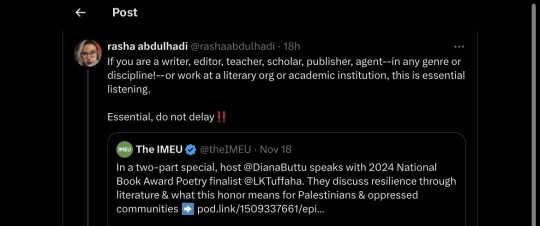
Poetry in a Time of Genocide, Part 1. “This Is Palestine” Podcast.
“In a two-part special, host @DianaButtu speaks with 2024 National Book Award Poetry finalist @LKTuffaha. They discuss resilience through literature and what this honor means for Palestinians and oppressed communities.”
[Image ID: Tweet by Palestinian organizer and poet, Rasha Abdulhadi.
Text: “If you are a writer, editor, teacher, scholar, publisher, agent— In any genre or discipline! — Or work at a literary org or academic institution, this is essential listening.
Essential, do not delay!!”
End ID.]
6 notes
·
View notes
Note
Hi Ball, 3,5,15,21 for Book Ask Game. Also I love your writing!
Thank you, and I love the singular “ball” 💀
3. Top 5 books of the year, referring to books I read this year, not books released this year —
STRANDINGS, P Riley: Non-fiction, about whale strandings in the UK and people involved with them, very eerie and delicious.
EINZELLER, G Klemm: German, about a feminist houseshare in Austria, very fun and gutting at the same time.
WO DIE GEISTER TANZEN, J Osman: German, homelands, homesickness, tracing her Turkish-Palestinian family through oral and archival records
ANTICHRISTIE, M Sanyal: German, just delightful author all round, about a houseshare of Indian freedom fighters of the 1920s in Britain, involves time travel too!
THIS STRANGE EVENTFUL HISTORY, C Messud: An intimate and lyrical portrayal of 1940s Paris as it falls to Nazi Germany — wonderful in its “city as a character”ness.
5. Genre I read the most this year:
LitFic if we’re talking strictly in genre terms but if I’m getting a bit more specific, historical ecofiction, “place” novels, autofiction, books that have houses as characters and ecological hauntings.
15. Whether I’ve read any prize shortlists/longlists and what I think of them:
So every year since I started writing original fiction, I’ve tried to read the full Booker longlist each round, managed all but two titles this year. I’d say the Booker is, as a rule, getting slightly less adventurous and starting to lean somewhat towards the NY MFA promoted style of writing in its picks — a slant that’s been slowly coming since the inclusion of the States in the prize. This is not necessarily a bad thing, however, the Booker used to be a very good vehicle for publicising postcolonial and “world literature” from the Commonwealth (sometimes to an excessive and rather voyeuristic degree) that did not adhere to general linguistic norms, hence the shift makes my eye twitch a little. This is mostly personal preference, however.
I have also read the long list for the inaugral Womens Nonfiction prize as I really would like to make book 3 a work of creative nonfiction — these were brilliant for the most part!
21. Whether I have read or watched BookTok/BookTube drama:
Absolutely not haha, I try my very best to avoid any of those spaces — however I did make a couple of peeks into the times my fucking battering ram post was shared in those circles just to make sure nobody I knew was in the conversation because I know 100% that anyone who knows me irl would know that was me simply because of the turns of phrase 💀
3 notes
·
View notes
Text
Famous Arabic Literature and its Impact on Arabic Language Learning
Arabic literature boasts a rich and diverse heritage that spans centuries, encompassing a wide range of genres, themes, and styles. From poetry to novels, Arabic literature has captivated readers around the world with its eloquence, depth, and cultural significance. In addition to its literary merits, exploring famous Arabic literature can have a profound impact on the process of learning the Arabic language. This article delves into the world of renowned Arabic literary works, highlighting their influence on Arabic learning. By understanding and engaging with these texts, language learners can deepen their appreciation for the Arabic language, expand their vocabulary, improve their grammar skills, and gain insights into Arab culture and history.
Classical Arabic Literature
Classical Arabic literature, dating back to the pre-Islamic era, lays the foundation for the Arabic language. Key words such as "Al-Mu'allaqat" and "Al-Masnavi" by renowned poets like Imru' al-Qays and Al-Mutanabbi offer linguistic richness and poetic excellence. These literary masterpieces showcase the power of rhetoric, symbolism, and imagery, providing learners with a deep understanding of the Arabic language's intricate beauty. Engaging with classical Arabic literature helps learners grasp the nuances of vocabulary, grammar structures, and cultural references that shape the language.
Islamic Literature
The advent of Islam brought forth a new era of Arabic literature, combining spirituality, ethics, and storytelling. The Holy Quran, the central religious text of Islam, is not only a sacred scripture but also a literary masterpiece. Exploring its eloquent verses helps learners develop a strong command of Classical Arabic, as well as an appreciation for the linguistic structures and rhetorical devices employed in the Quran. Moreover, Hadith collections, such as Sahih al-Bukhari and Sahih Muslim, provide insights into Islamic teachings and customs, offering learners a comprehensive view of the Arabic language in its religious and cultural context.
Modern Arabic Literature
Modern Arabic literature encompasses a vast array of genres, including novels, short stories, and plays. It reflects the social, political, and cultural transformations of the Arab world in the 19th and 20th centuries. Prominent authors like Naguib Mahfouz, Ghassan Kanafani, and Tayeb Salih have crafted literary works that tackle universal themes while showcasing the intricacies of the Arabic language.
Naguib Mahfouz: Mahfouz, the Nobel laureate, is widely regarded as one of the most influential Arabic novelists. His works, such as "The Cairo Trilogy" and "Miramar," explore the complexities of Egyptian society and offer a linguistic richness that exposes learners to various dialects and registers of Arabic. Engaging with Mahfouz's literature enhances language learners' vocabulary, grammar, and comprehension skills, while also deepening their understanding of Arab society and history.
Ghassan Kanafani: Kanafani, a Palestinian writer and activist, is known for his poignant short stories, including "Men in the Sun" and "Returning to Haifa." Through his works, Kanafani sheds light on the Palestinian struggle and the consequences of displacement. Exploring his literature allows learners to engage with colloquial Arabic and exposes them to the social and political realities of the Arab world, enhancing their language proficiency and cultural awareness.
Tayeb Salih: Salih's novel "Season of Migration to the North" is regarded as a masterpiece of Arabic literature. It delves into themes of identity, colonialism, and cultural encounters. By immersing themselves in Salih's lyrical prose, learners develop their vocabulary, comprehension, and critical thinking skills. They also gain a deeper understanding of the cultural and historical contexts that shape the Arabic language.
Impact on Arabic Learning
Studying famous Arabic literature offers numerous benefits to language learners:
Vocabulary Enrichment: Reading literary works exposes learners to a vast range of vocabulary, including formal and colloquial expressions, idiomatic phrases, and specialized terminology. This exposure expands learners' vocabulary repertoire, enabling them to communicate more effectively in different contexts.
Grammar and Syntax: Literary texts showcase various grammar structures, verb conjugations, and sentence patterns. Analyzing these structures helps learners deepen their understanding of Arabic grammar and syntax, leading to improved writing and speaking skills.
Cultural Understanding: Arabic literature provides valuable insights into Arab culture, traditions, and societal issues. Engaging with these texts enhances learners' cultural competence, allowing them to communicate with native speakers more effectively and fostering intercultural sensitivity.
Critical Thinking and Analysis: Literary works often require critical thinking, analysis, and interpretation. By examining themes, characters, and narrative techniques, learners develop their analytical skills and learn to appreciate the subtleties of the Arabic language.
Language Fluency: Engaging with famous Arabic literature exposes learners to authentic language usage, immersing them in the linguistic nuances of the Arabic language. This immersion contributes to overall language fluency, allowing learners to navigate conversations and texts with greater ease and confidence.
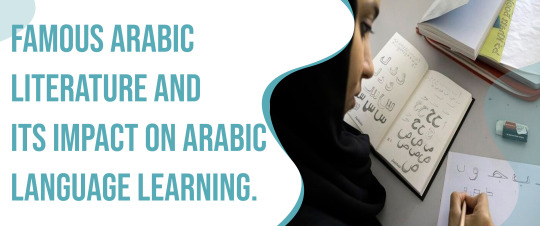
The Importance of Arabic Learning in Today's Globalized World.
In our increasingly interconnected world, learning a foreign language has become an invaluable asset. Among the many languages spoken worldwide, Arabic stands out as a language of great significance and relevance. Spoken by more than 400 million people across the Middle East and North Africa, Arabic serves as the language of the Quran, the holy book of Islam, and is the official language of 22 countries. In this article, we will explore the importance of Arabic Learning in today's globalized world. From its cultural and historical significance to its economic and diplomatic relevance, acquiring Arabic language skills offers individuals a unique advantage in various domains, including business, academia, diplomacy, and intercultural understanding.
Conclusion
Famous Arabic literature offers a treasure trove of linguistic, cultural, and historical value for Arabic language learners. From classical masterpieces to contemporary works, engaging with these texts enhances vocabulary, grammar skills, cultural understanding, and critical thinking abilities. By delving into the rich literary heritage of Arabic, learners not only develop proficiency in the language but also gain a profound appreciation for its intricate beauty and its impact on Arab society and culture.
16 notes
·
View notes
Text
Right, fuming medical student here. Buckle tf up:
the A&P book is a locally written medical textbook, meaning the authors typically write dedications in their mother tongue: Arabic (its common practice to write in both arabic and english for dedications/ forwards etc.) as opposed to international medical textbooks like my Tortora A&P textbook.
not only is the paper a different colour, the font is larger and unmatching, its not even the same size paper and is sticking out from the bottom
Grave spelling mistake: its "sacrificed" not "sacrify" you illiterate cancerous growth. Medical textbooks get proof-read you imbecile
i cant be sure, but something tells me Hamas has better things to do than planting fake evidence (bc they have real, incriminating footage lol) in a random textbook... like ridding the world of your idiocy. but its just a hunch idk :)
for the billionth time, JEWS AND ISRAEL ARE NOT INTERCHANGEABLE TERMS unlike you have been conditioned to believe. Jews are those who follow the religion of Judaism, Israel is an illegal, occupying, colonial, settler, war criminal state created in 1948 on stolen Palestinian land.
and fyi; nothing, nothing you [IDF/ israel] do will ever 'reduce' the hate for israel. your lies have forever been uncovered for the whole world to see. anti-zionism is not anti-semitism, a simple google search will verify this.
Martrys by definition (regardless of religion) are people killed because of their religious beliefs, whereas terrorists are defined as those who use intimidation and unlawful violence in pursuit of political goals:
1- DYING FOR YOUR COUNTRY ISNT A POLITICAL STANCE; its an honour and a duty that many people dedicate their lives to. this may sound odd in the west, but in the middle east (esp in Palestine), our history and culture and heritage is deeply rooted in the land and most people will gladly die for their countries. this ofc is not limited to the MENA region. ALSO, theres an entire genre of art and literature dedicated to the love and longing for one's homeland (Haneen) just to drive the intense love people have for their native lands home <3
2- those Palestinian martyrs died protecting their land and mosque, where is the terrorism here? the rocks?? the molotovs?? saying no to an illegal occupation? breathing in the wrong direction????????
3- they died because they were shot, assaulted and violated by the worlds second most powerful army. the only terrorists are the IDF soldiers who match the definition of terrorism to a T
4- dedicating a book to the souls of martyrs who died were murdered for resisting an illegal occupying state is apparently a crime now? what where they supposed to do? give you the key to their homes and land and holy sites with smiles on their faces? what barbarism is this? what depravity?? if this were ukraine they would be hailed as heros, but because there are Palestinians/ Middle Easterners/ Arabs/ Muslims who are dying being killed left right and center, its ok. Take Sudan rn for example. complete and total silence. typical.
israelis arent innocent. theyre settlers who live in stolen homes on stolen land and dont hold back when expressing their hate and despicable intolerance of Palestinians and Arabs alike. If yall dont want to die, maybe give back what youve stolen and leave the land? idk just an idea.
Israel doesnt want peace, never has, never will. this pathetic fabrication is now one of millions of pieces of evidence piled against israel.
as if a human being with higher cognitive function will ever think "wow, a book (incorrectly) dedicated to Palestinians is hate speech! this IDF hero is so right!! they dont want peace!!! the earth is flat and trump is living in my attic!!!!!!"
i will, with every breath i have till my dying day, keep talking and yelling and screaming about Palestine. i want to die with a clear conscience thank you. and though my efforts are humble and negligable, i refuse to sit and do nothing. i will never shut up i promise.
thank you for coming to my TED talk.
Another fabricated evidence.
Noy Leyb plants a fake paper into a school book for a propaganda video. The paper has 8 folds, while the one before and after does not have any. It is written in English, and the spoken language of the people there is Arabic.
I like the bit where the first two pages (clearly fresh out of the photocopier) have a shade of white lighter than the slightly off-white colouring of the rest of the pages.
C+ for effort.
A+ for stupidity.
F for overall performance.
#gaza#free gaza#palestine#free palestine#sudan#israel#genocide#ethnic cleansing#anti israel#anti zionisim#muslim#christian#jew#jews for palestine#medical student#anatomy and physiology#medical textbook#propaganda#fake evidence#idf#idf terrorists#israel terrorist#save gaza#gaza strip#martyrs#arabic#sudan genocide#free palestine 🇵🇸#save palestine#free the palestinians
3K notes
·
View notes
Text

minor detail // adania shibli
first published: 2017 read: 26 june 2024 - 27 june 2024 pages: 112 format: paperback
genres: fiction; adult; literary fiction; historical fiction; palestine-israel war favourite character(s): n/a least favourite character(s): n/a
rating: 🌕🌕🌕🌗🌑 thoughts: this book was not on my radar until my sister read it earlier this month and recommended it to me. my expectations were quite high, and, while its didn't quite match my expectations, i'm still glad i read it if only to get more insight to life in Palestine as told by a Palestinian author.
the novella is split into two parts: the first is a third-person focus on an Israeli soldier during the 1949 war, and the second is a first-person account of a Palestinian woman in the future investigating the atrocities committed by the soldier. no characters are named. i found part one to be better than part two. part one pulled me in an interesting way, with a constant underlying tension and unsettling feeling despite the mundanity of the narrative. there was some sense of wondering what would happen next. i didn't feel this so much in part two. i felt it meandered way too much and came to an unsatisfying conclusion (which i understand may be the entire point but i still didn't enjoy reading it). i did like the understanding gained into what it's like living in an area that is under constant attack and surveillance, where your people and their homes have been wiped off the map in a matter of years. both parts gave good insight into what it is like living amid conflict.
i liked that the book was so short as it did pack a decent amount into a very short time. at the same time i might've liked the book to be a bit longer to allow me to form a bit more of an emotional connection, especially with the narrator of part two. i didn't feel so moved by how the story ended.
again, i'm glad i read it, especially as it's timely and i'm wanting to branch out and read literature from around the world as much as i can. i would've liked a bit more of everything - emotional connection, focus, satisfaction - but the brevity of the story means it didn't feel like a time sink.
#minor detail#adania shibli#2024 reads#3.5 stars#fiction#historical fiction#book review#booklr#bookblr#bookworm
1 note
·
View note
Text
Is Cyberpunk 2077 Orientalist?
No.
But that would be a poor counterpoint to the internet essays and YouTube videos that accused Cyberpunk 20777 being orientalist.
I obviously love Cyberpunk 2077 a lot. I enjoyed "cyberpunk as a genre" mostly through anime and manga than Hollywood or western literature.
But I also spent a significant amount of my life studying the history of the British Imperialism of Southeast Asia in the 19th century and the Japanese Occupation of Asia Pacific in the 20th century because like most of the people within Asia Pacific, we all struggle with intergenerational family trauma. I wanted to understand why.
Therefore, I felt compelled to address a couple of troublesome shallow criticism specifically against this game and I want to call out a particular dangerous subtext within some of the articles that I've read.
This post is very lengthy.
What is Orientalism?
Orientalism was a body of fact, opinion and prejudice accumulated by western academia. It argued that colonialism was a system of political rule and an all-round worldview that believed the west was superior to the east. It involved the power to disseminate knowledge to collaborate with the western power to justify their domination of the east.
This term was coined by Edward Said who was a Palestinian-American professor of literature and the founder of the academic field of postcolonial studies. His criticism was against the norms of the western academia and against corroborating with systems of power and giving the justification for centuries of colonization and subjugation particularly against the people in the Near East particularly the Islamic world.
What is Japanese Imperialism?
During the Sengoku period when Japan was just an island with a lot of warring Samurai clans. Through political and military might, Toyotomi Hideyoshi united Japan in 1590. In 1592, he launched invasions against the Joseon dynasty and it's proxy, the Ming dynasty. They failed spectacularly but this left an indelible mark against the collective psyche of Japanese people for several centuries.
Japanese imperial ambitions resurged around the end of Tokugawa Shogunate and the start of Meiji Restoration. Factored in by the span of the relatively peaceful Edo period under various shoguns, the push to end Japan's isolationist policies (Sakoku) from within and outside (European powers and mostly, USA), the start of Bakumatsu and the dreams of constitutional absolute monarchy. All of contributed to the complete disintegration of Japanese feudal caste-based society fueled by the discontent of peasant class wanting social mobility, the disaffected samurai class and the prosperity of the merchant class during the industrialization period which lead to Zaibatsu emergence; conglomerates of families controlling certain aspects of Japanese economy.
With the desire for international prestige, pressured to sustain their newly oiled capitalistic machine with the expansion to overseas foreign markets while maintaining dominance within domestic politics; Japan realized that they lack the necessarily resources within it's own borders. It began to look toward it's neighbour again; Joseon (Korea).
Thus, the start of Sino-Japanese War (1894) which lead to Russo-Japanese War (1904), then the invasion of Manchuria (1931-1932), the Second Sino-Japanese War (1937) and the expansion throughout the Asia Pacific during World War II (1941-1945).
What is Self-Orientalism?
This was a willful conscious and/or unconscious attempt of using stereotypical portrayals by accepting and performing them to suppress own authentic representations. This also happened to regions on the outset of Eurocentricsm, (cultures and people who have been colonised, subordinated or simply influenced), becoming more globalized and becoming available to western projections about what is or should be other. Thus many learned to accept and appropriate orientalism as a strategic method to gain benefits, recognition and position themselves especially within the Western-dominated global economy, system and order. (i.e: entertainment industry, tourism industry, etc)
What is Occidentalism?
Occidentalism was an inversion of Orientalism. Defined as the distorted and stereotypical views against the West by the East. But even with the current political climate, the true use and influence of Occidentalism have limited applications.
The more robust Orientalism operated within global asymmetrical power relations resulting in the hierarchic othering process by the western hegemony. We don’t live in a world where the complete opposite happened to have the true form of Occidentalism.
Currently, the term was mainly used to describe the anti-European or anti-American ideology by Islamist fundamentalists or Chinese and Japanese nationalists (including North Korean nationalists and Russian Imperialists).
What is Japanese Occidentalism?
As a former-imperialist and current-capitalist power, Japan occupied a unique position where it was currently seen almost as an equal to the modern western world. Occidentalism manifested through their WW2 war propaganda against the western allied forces.
But Japan was briefly occupied by the United States of America from 1945 to 1952. That forced the Japanese people and the nation to reconstruct itself around it's own national tragedies (the atomic bombing of Hiroshima and Nagasaki) and to reestablish itself as a formidable nation that was desperate to salvage whatever remained of it's own pride and identity.
Sometimes distorted portrayals of the west manifested itself in popular culture or criticism against the west’s intervention into current Japanese politics but never quite carry the same impact especially to the modern Japanese people.
Or except for a few.
What is Japanese Historical Revisionism?
Much like Holocaust deniers in the US, there was an ongoing revival of ultranationalism project to revise and sanitize the history of Imperial Japan in the 20th century. It was done under the impression that these factual atrocities that happened not so long ago to our grandparents’ generations was just a product of historical distortion and anti-Japanese sentiments by the West. Under this line of thoughts; any negative historical portrayals about the Japanese people was simply assumed as Japanophobia.
Not surprisingly. This is still an active and thorny political issue between many nations subjugated by Imperial Japan particularly between South Korea and China. From the enshrinement of war criminals and honoring the dead soldiers in the Yasukuni Shrine to the lack of reparations and official apology to the survivors of wartime sexual slavery to the attempts at rewriting history books that minimize the scale and significance of Japanese war crimes and the complicity of United States' government and it's muddled foreign policies in this region.
***
Emperor Akihito of Japan; during the National Memorial Service for War Dead in 2015 :
“Reflecting on our past and bearing in mind the feelings of deep remorse over the last war, I earnestly hope that the ravages of war will never be repeated. Together with all of our people, I now pay my heartfelt tribute to all those who lost their lives in the war, both on the battlefields and elsewhere, and pray for world peace and for the continuing development of our country.”
Former Crown Prince and the current Emperor Naruhito of Japan in 2015 :
“[I] did not experience the war … it is important today, when memories of the war are fading, to look back humbly on the past and correctly pass on the tragic experiences and history Japan pursued from the generation which experienced the war to those without direct knowledge.”
***
Why does all of these matter when discussing or criticizing portrayal of Japanese people and culture within Cyberpunk 2077?
Because having the larger picture mattered when discussing real world history and politics into Mike Pondsmith's Cyberpunk.
Orientalism placed the particular importance of imbalance of power dynamics between the East and the West. Particularly, how the distorted representation and process of dehumanization of people and their culture would justify the Western hegemonic superiority against its lesser Eastern counterpart.
Pondsmith's Cyberpunk is an alternate timeline where technological advances diverged into a dystopian dark future where megacorporations ruled humanity. This is also a world where the collapse of superpowers of all major nations on the planet.
Unlike the story of our world where Japanese Zaibatsu were mostly dissolved during Allied Occupation and Reconstruction of Japan (1942-1952), Arasaka Zaibatsu survived through the modern era and into the 21st century; mostly led by a former Japanese Imperial soldier and heir to Arasaka family; Saburo Arasaka.
They were Imperial Japanese relics from 20th century that could only survive through fictional portrayal. They were not meant to be the representative of Japanese people or culture or society. In fact, the larger part of the nefarious elements within the storytelling was the purposeful appropriation of Japan and it's people by the villain himself.
This felt very purposeful and added a lot of depth into the character because this was what I imagined when I read and listened and empathized with the survivors' account of having to work for the Japanese Imperialists during the occupation. How they need to survive. It was all meant to inspire this feeling of inward hatred for working with the enemy who have very little respect or empathy for you as a human being.
Arasaka used self-orientalism to rebrand themselves with the Japanese identity, values and mythology to further it's own corporate ambitions. It have it's own self-styled royal family, appropriated the legends of Izanami and Izanagi, created their own digital underworld and used Japanese ultranationalist elements to justify it's rule against the world but primarily the subjugation of Night City and it’s people.
Personally, I became very impressed with the way Cyberpunk 2077 immediately present all of these elements within the introduction of Corpo V storyline. From the talk with Jackie, the way V's colleagues reacted to them with either disgust or suspicion. I immediately felt sickened when I watched the elevator's wall documentary glorifying this imperial Japanese soldier who happened to be the chairman of the company itself.
And then I began to recognize a lot of elements that I associated with 20th century Japan. Karayuki-san. Comfort Women. Comfort Stations. The treatment of women within Arasaka's society. The weaponism of Bushido. There was also this hint of Japanese occidentalism against the West. Then everything made sense for me. All of this was the world created by Saburo Arasaka. A world where his Japan never lose the war against the US. A world where he was the emperor and have the power to set the destiny of his own people and his enemies.
Saburo reimagined his own Japanese identity, his national history that placed his ideals of Japan being more superior in a screwed up selfish way and everyone suffered for it.
It felt like a living nightmare because it was intended to be.
The exploration of an alternate world where Japan seemingly won WWII was nothing new. I read Phillip K Dick's The Man in the High Castle as a teenager and followed the 2015′s Amazon television adaptation. Back then I realized not everyone was exposed to this aspect of Imperial Japanese history either through history classes or fictional portrayals. There was also a tendency to magnify American involvement and the push for sympathetic portrayals of Imperial Japanese Army and it’s government while giving little attention given to the lived realities of people brutally victimized by them (which included prisoners of wars from UK, Australia and other countries). Compounded by the need to be kinder to this region of history meant there was less interest in media unlike the constant popularity of the WW2′s Axis counterparts.
But Cyberpunk TTRPG and Cyberpunk 2077 did more than just reimagining an alternate history. By using cyberpunk's convention, you're forced to be within the perspective of the oppressed rather than the oppressor. This act of humanizing the narrative of the little people struggling against an oppressive system was important because it was easier to desensitized against them. To pretend ignorance about the unrepresented because there was enough suffering in the world already.
For this alone, Cyberpunk 2077 is one of the most important post-colonial work that examined WW2 Imperial Japan as a cautionary tale.
TL;DR : But really, is Cyberpunk 2077 orientalist?
No.
I don't think CD Projekt RED and R. Talsorian Games willfully does that...? I haven't yet read the official statements, but I felt CDPR are all well-aware of the content of their game and familiar with the concepts of Orientalism, Self-Orientalism and Occidentalism. Which was then applied to their works; visual narrative, story and characters etc.
It can be debatable whether each of those post-colonial academical concepts were clarified enough within the Pondsmith’s Cyberpunk but these terms by themselves are subjective. Whether they would attract more academic interest into this game, be my guest.
Was it cultural appropriation...? Yes. Because that was the whole point of the settings, the story and the fictionalization process.
The term Orientalism itself was tied to the western power dynamics and perpetuating and disseminating a false but dominant worldview. In Cyberpunk, the west have been decimated and most nations have all collectively been disempowered including USA. But taking offense about negative portrayals of people with the context of historical elements or a setting portraying an aesthetic based on certain culture; that was never what criticism of Orientalism being about.
For internet essayists, be aware that these academic terms weren't meant to be derogatory either to the creator or against the the consumer. When criticizing what you felt as “negative portrayals/Japanophobia”; understand that not even Japanese people are incapable of orientalist cyberpunk works; Psycho-Pass: The Movie was horrible at portraying Southeast Asians and it won Best Picture and Screenplay in 2015. Also, keep in mind about historical revisionism that seek to minimize anything about Imperial Japan in the 20th century.
Also, CDPR did the localization in South Korea and Mainland China.
More references :
While I can only speak for myself as a Malaysian with close families who survived the Japanese Occupation but shouldn't something like this blew up even worst? Like in the scale of international incident? Wouldn’t there be more articles especially by born and bred Asians like me who would readily speak out especially with all the sensitive nature and topics?
Or maybe, Mike Pondsmith’s Cyberpunk have done something right after all?
1. Edward S Said’s Orientalism
2. Edward S. Said’s Culture and Imperialism
3.��Occidentalism in Japan
4. Towards Critical Occidentalism Studies: Re-inventing the 'West' and 'Japan' in Mangaesque Popular Cultures
5. Forgiving The Culprits: Japanese Historical Revisionism in a Post-Cold War Context
6. The Comfort Women: Japan's Brutal Regime of Enforced Prostitution in the Second World War
7. The Rise and Fall of the Zaibatsu: Japan's Industrial and Economic Modernization
8. The Meiji Secret: The Emergence of Zaibatsu Dominance in Japan
#Cyberpunk 2077#Cyberpunk essay#Cyberpunk#Japanese history#Japanese Revisionism#video game#Orientalism#Occidentalism#Self-Orientalism
56 notes
·
View notes
Text
Rifqa is Mohammed El-Kurd’s debut collection of poetry, written in the tradition of Ghassan Kanfani’s Palestinian Resistance Literature. The book narrates the author’s own experience of dispossession in Sheikh Jarrah—an infamous neighborhood in Jerusalem, Palestine, whose population of refugees continues to live on the brink of homelessness at the hands of the Israeli government and US-based settler organizations. The book, named after the author’s late grandmother who was forced to flee from Haifa upon the genocidal establishment of Israel, makes the observation that home takeovers and demolitions across historical Palestine are not reminiscent of 1948 Nakba, but are in fact a continuation of it: a legalized, ideologically-driven practice of ethnic cleansing.
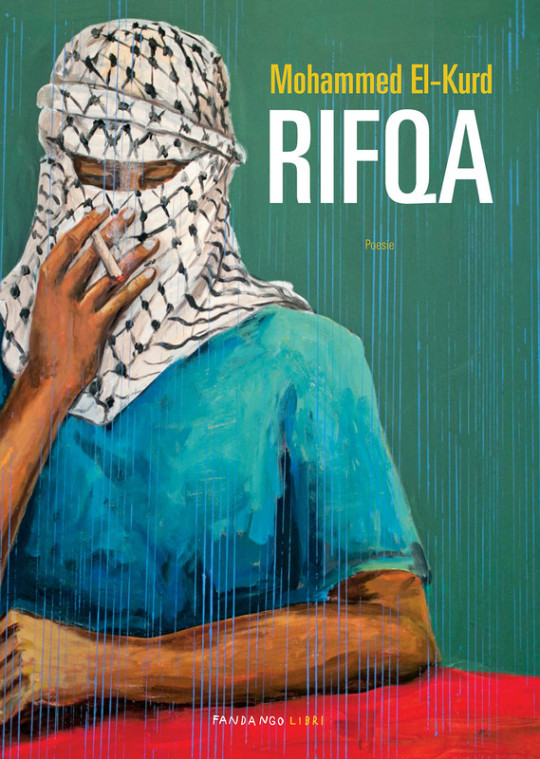
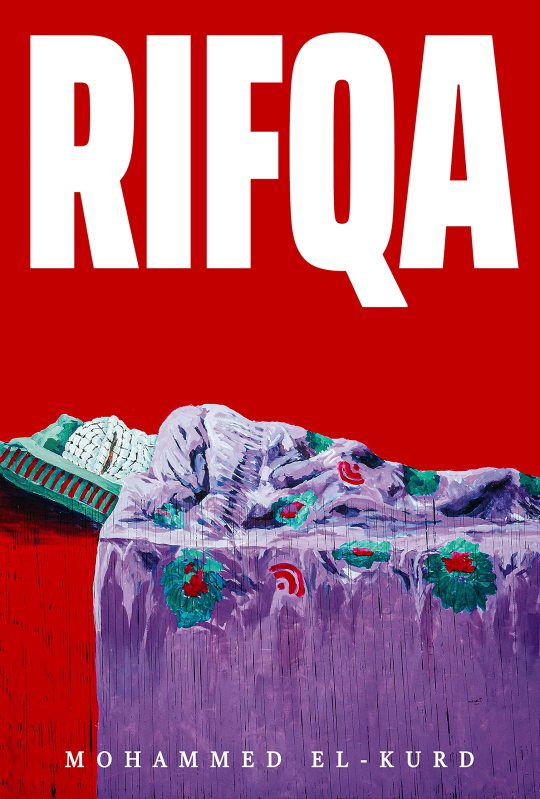
#book: rifqa#author: mohammed el-kurd#genre: non fiction#genre: poetry#genre: palestinian literature#year: 2020s
9 notes
·
View notes
Note
Do you have any nonfiction recs? 👀
HELLO VITA hiii how are youuu <333 and yep!!!!
since you haven't asked for a particular genre of non fiction i'll be a little all over the place but if you have some area in particular let me know!!
the emperor of all maladies: a biography of cancer - siddhartha mukherjee. (science) exactly what it says on the tin. i read this probably a little too young under weird circumstances but it was SHOCKINGLY riveting for kid me. absolutely fascinating, and really well written for a book about...well, basically cancer! i don't know how to sell it except to say it still remains one of my most favourite books ever
ants among elephants: an untouchable family and the making of modern india - sujatha gidla. (autobiography | history) it's a biography about a dalit christian family from andhra pradesh and it's super compelling. obviously i can't speak with total authority about what that experienceTM is since it's soooo varied but AS someone from a dalit christian family from andhra pradesh it felt so so true down to minute details. the naxalite movement and its depiction is the part of the book that is more debated in critic circles but even then it is still an absolutely fascinating look into that complex history
curfewed night - basharat peer (memoir). peer is a journalist whose family was personally affected in the 90's during insurgency in indian-administered kashmir. good place to start to learn more about the conflict. it's a short read but super powerful. didn't know haider was partially adapted on this until recently!
a bunch of non-fiction graphic novel recs because i love non fiction graphic novels: alison bechdel's fun home i loved it soo soo so much and it kind of changed me in the last year of school lol, it's about many things but especially about her complicated father. persepolis by marjane satrapi, a wonderfull read on iran and feminism and satrapi herself. palestine by joe sacco which is about palestine through the eyes of joe sacco, a journalist, and gives you a glimpse of palestinian history as well as the conflict and its present day ramifications. munnu by malik sajad! this is also an autibiographical book on kashmir and an excellent importantl read. the author portrays the kashmiri people as the endangered hanguls. the concept was based on art spiegelman's maus which of course if you haven't read is itself an automatic recommendation.
a few non fiction essay collections that live rent free in my brain - arundhati roy's entire oeuvre of course, but especially an algebra of infinite justice (the collection, not just the essay of the same name). the education of a british protected child by chinua achebe is excellent in many brilliant ways, but especially the essays on language and literature are <33
#this is all over the place fgcfvecedgc but yeah!!! just a few that sprung to mind lmk if you have any genre in particular#bookclub#doughfaceddcpig
24 notes
·
View notes
Text
I’ve been a ghost in this hellsite, and I decided to do a book questionnaire based on @dhaaruni‘s own take on the New Yorker’s “By the Book.”
Here we go.
What books are on your nightstand?
I used to keep what I’m currently reading on my nightstand, but unfortunately, said nightstand is too small for the number of books I am reading. Right now, the nightstand holds my sleeping mask, bookmarks in a box, hand cream, and my Himalayan salt lamp.
Marie Kondo has been a blessing for my bedroom, so I keep all the books that I have, including library books, on my shelves.
What’s the last book that really excited you?
Oh, so many. I’ve checked out from my library the Jacob Tobias memoir, Sissy: A Coming-of-Gender Story. I am close to done with Patricia A. McKillip’s elegant Alphabet of Thorn. I also checked out We Need to Talk: How to Have Conversations That Matter by Celeste Headlee. There is also California dreamin' by Penelope Bagieu.
And to show off just how often I abuse my library card, I also have on interlibrary loan: The Art of Eating by M.F.K. Fisher, The Palestinian Table by Reem Kassis, and House of Psychotic Women: An Autobiographical Topography of Female Neurosis in Horror and Exploitation Films by Kier-La Janisse.
I recently bought two titles that I am enthused to read as soon as I get the chance. Olivia Waite’s The Lady's Guide to Celestial Mechanics and C.S.E. Cooney’s Desdemona and the Deep.
Now you can see what I meant about my nightstand being too small!
What’s your favorite book no one else has heard of?
Oh, lord, too many to name! Angela Carter has been getting more notice as of late, but I still think she needs more recognition. I feel the same way about Caitlín R. Kiernan. I also think everybody should give Sarah Monette/Katherine Addison’s The Goblin Emperor a try!
What book should everybody read before the age of 21?
The Bloody Chamber and Other Stories by Angela Carter.
What book would you recommend to people over 40?
The Last Unicorn by Peter S. Beagle. I can’t say precisely how, but it feels like it captures the pain of youth. I think they should also read Francesca Lia Block. I think she captures what young women dream about and what they hurt over really well.
Which writers — novelists, playwrights, critics, journalists, poets — working today do you admire most?
C.S.E. Cooney is marvelous. I have also been enjoying Courtney Milan’s romances as well as her contemporaries’ works. There is Sarah Monette, Sarah Waters, Donna Tartt, Beverly Jenkins, so many women to admire. If anyone ever decries writing today as not being “good as it used to be,” they’re fucking hacks.
What moves you most in a work of literature?
When a character realizes they deserve better, especially if it’s a woman that recognizes this.
Do you prefer books that reach you emotionally or intellectually?
I think they have to be intelligent to know how to get to me emotionally. There is no distinct line between emotion and intelligence, in fact, it can be argued that you cannot have one without the other. Otherwise, intelligence just becomes a coldness, and emotionality becomes hysteria.
What’s the most interesting thing you learned from a book recently?
I think Marie Kondo’s work really taught me to value the things I own. When I was doing the KonMari method, I discovered these birthday cards that my late grandfather had given to me as a child. They had been buried under useless papers that I never bothered to toss aside. It is scary to think about U.S. consumerism, but then again, I do have socialist leanings so hah.
Which genres do you especially enjoy reading? And which do you avoid?
I love romance. I am a romantic person, so I always get excited about romance in a romance novel, or within a horror story, fantasy, and so forth. I like reading about different relationships, such as siblings, parents-and-children, in-laws, friendships, and so forth. I think the complexities of human relations is essential to me as a reader.
I don’t like Westerns, I will be honest. I see them, and I think propaganda. I’m Mexican and Palestinian, and I can’t unsee the subtext of white people moving to the west, using God as a tool to justify taking from Native Americans. John Wayne is no hero.
I think the closest to a Western I have ever enjoyed was the anime, Trigun. And that deals with human beings of all backgrounds settling in a new planet, so there you go.
What’s the best book you’ve ever received as a gift?
My dad got me a book that was entire of Grimm’ fairy tales, from the famous ones to the least-known. And these stories were the version where Cinderella’s doves took out the eyes of her sisters. So, you can imagine how this influenced eight-year-old me to become the person I am today.
Who is your favorite fictional hero or heroine? Your favorite antihero or villain?
Oh, this is hard. I’m going to have to give a cop-out answer and say there are too many to name.
What kind of reader were you as a child? Which childhood books and authors stick with you most?
I was a late-bloomer. All the kids in my first-grade class already knew to read since kindergarten. I did not. I had these two fantastic reading teachers that eventually taught me. I may have started later than all my classmates, but I ended up becoming more well-read than they did. I would go to the elementary school library three-to-four times a week to check out books. The librarians really enjoyed me.
I was bullied a lot growing up, so books were my way to heal. Francesca Lia Block’s Violet and Claire really shaped me as did fairy tales and Greek mythology. I also read Blood and Chocolate in middle school, and I had never met a main character as unapologetically sexual as Vivian. I think that book really influenced some of my feminism, despite its other issues. There was also The Witch from Blackbird Pond. Oh, and the Animorphs series. There was also the Babysitter’s Club books, which really made me want female friendships portrayed more often in other stories. A Corner of the Universe, which is also by Ann M. Martin, really impacted me--it is troubling how much I ended up relating to Adam in that story.
You’re a digital native, and your publisher describes you as “what Susan Sontag would have been like if she had brain damage from the internet.” Do you find it difficult to tune out distractions and sink into a book?
I do, mostly I blame it on graduate school burning me out. I also work full-time, so my brain sometimes just wants to shut off, and I look up stupid stuff on the Internet. I think I am getting a little better about it though. I try to clean my space as much as possible, and that helps clear my mind.
Disappointing, overrated, just not good: What book did you feel as if you were supposed to like, and didn’t? Do you remember the last book you put down without finishing?
V.E. Schwab’s A Darker Shade of Magic. I mean, I did end up liking it, but not too much. I actually forgot most of the plot. I can say that I like Kell and Holland a lot. The rest of the book had great ideas and mostly good executions of those ideas, but the narrative had an air of superficiality that I just couldn’t get over. Also, I was legitimately frustrated by Lila Bard. She had to be one of the cheapest depictions of Strong Female Character I’ve seen in a long time. I couldn’t get into the Hunger Games either. I gave up on A Song of Ice and Fire halfway through.
What books are you embarrassed not to have read yet?
I don’t get embarrassed as much about that sort of thing these days. I do want to read Angela Carter’s entire bibliography one day. I also want to read the unread books on my shelves.
What do you plan to read next?
Angela Carter and some progressive Catholic works, hopefully.
2 notes
·
View notes
Note
16, 27 and 39 for the bookish asks :)
Hi anon, thanks for asking!
16: If you could bring three books to a deserted island which would you bring and why?
1. The Amazing Adventures of Kavalier & Clay
I read that book six months ago and I haven’t been able to stop thinking about it since. It is just so fucking good, it’s honestly hard to describe just how much it means to me. Like, I could tell you how great the plot is, and how great the characters are (especially Sammy, I love him so much), and how beautifully overwrought the language is (Chabon’s overwritten style is exactly the kind of shameless pretentiousness that I am here for), or how much I love the theme of escape and the emphasis on the value of so-called “low-brow” media, or how much Joe’s story reminds me of my grandfather’s, or how wonderful it is to read a story written by a Jew about Jews who created an entire art form basically so that they could make money off their revenge fantasies towards Nazis, which is actually a pretty accurate description of the early comic book years, and like, I could go on. But honestly, even all that doesn’t really capture the emotional journey Chabon took me on, and if I were stranded on a desert island, I’d want to have a book that made me feel that thoroughly.
Plus, it’s like, really long, so it should entertain me for a while.
2. The Complete Works of Virginia Woolf
(Yes, I realize that doing ‘the complete works of’ is cheating, but I’m doing it anyway).
I’ll be honest, I keep meaning to read a book by her, and other books keep getting in the way, and I feel like a desert island might be the perfect place to finally catch up. Plus, I did read A Room of One’s Own for school once, and that was really good. So I feel like I know what I’m getting into, and I’m fairly certain I’ll enjoy it.
3. Orientalism
I think I just need to reread that one. Like obviously there are more modern, up to date takes on post-colonialism, but there are very few books that have had quite the impact on the world of academia. And obviously it’s not perfect, but it’s also one of those academic texts that need to be studied regardless of how old it is. I mean, it’s the book that basically created post-colonial theory, which is an indescribably huge accomplishment, obviously. But it’s more than that. It’s an emotional book, like it’s righteously angry. And that’s so fucking important, because Said has every right to be angry. I mean, what he’s writing about is infuriating, and it affects him directly. So I think part of what makes that book so important, makes it a work of literature in addition to a work of academia, is that he doesn’t even try to do the smug academic detachment thing.
Plus, I think that as an Israeli person, it’s my responsibility to educate myself on the works of Palestinians about colonialism and how it affects them, and what better place to do it than on a desert island.
27: If you could change one thing about mainstream literature what would you change? (i.e. more diversity, better writing, better plot etc.)
I mean, more diversity, better writing, better plot - it all sounds good to me.
But I guess if I had to pick something else, I wish that some of the authors of mainstream adult literature would stop writing like they’re too cynical for human emotions. I’m not really sure how else to describe it, but there’s a genre of literature that’s kind of obsessed with not caring about how characters feel, and it makes for a very unpleasant read. I mean, I have nothing against generally ambivalent third person narration, but I feel like you can do that without sacrificing the human element, or a reader’s connection with a character, and some authors sacrifice that on purpose. I get the whole Brechtian detachment thing, but sometimes it’s just not fun. And I feel like it’s one of the main factors that leads adults to retreat to YA, because it’s a genre that guarantees that authors don’t think they’re too good for feelings.
39: Name one of your favorite childhood books
Not naming just one, because I can’t choose.
First and foremost, Percy Jackson and the Olympians. I was absolutely obsessed with that series. I read each book so many times I lost count. I also read the sequel series and the Kane Chronicles (which no one remembers, although that might be a good thing considering Sadie ends up with a like a weird magical combination of her two love interests, one of whom is a literal immortal god, and she’s like 12. I mean, wtf Rick?). Unfortunately I grew out of Riordan’s stuff right around the time it became really super gay, so I never got into Magnus Chase and the like.
Additionally, A Wrinkle in Time was one of the first books I remember reading and thinking, “Wow, this is actually challenging me and the way I see the world.” And when I was younger the work of Michael Ende and Erich Kästner were often featured during bedtime (Jews really like Germans who hate Nazis).
#the amazing adventures of kavalier & clay#kavalier and clay#virginia woolf#a room of one's own#edward said#orientalism#pjo#percy jackson and the olympians#rick riordan#the kane chronicles#a wrinkle in time#michael ende#erich kästner#michael chabon
3 notes
·
View notes
Link
0 notes
Text
Ten Questions Book Review - Memory of forgetfulness by Mahmoud Darwish
What is it? 1982, Lebanese Civil War and Israeli invasion of Lebanon. Thoughts of life and death, belonging and relationships for a Palestinian man living in this context.
Who should read it and why? This book is excruciatingly beautiful. Everyone should read it.
Which genre(s) is it? Autobiography that somehow reads like a poem, despite being prose.
What is the setting? Set in Beirut, August 1982, during the aforementioned Lebanese Civil War and the Israeli intervention in the war.
How are the characters? The characters, even if their names are usually not specified, are real people, rather than characters, so judgin this is hard. But the people in this book, nameless or otherwise, become very much alive, and I loved it despite the fact that it just added to the heartbreak.
What are the strengths and weaknesses of the novel? All the poetic images, all the metaphors, are the greatest strength of the book. As for weaknesses, I would account my own very scarce knowledge of Arab and Palestinian literature. I am sure that I would appreciate this book even more if I had more knowledge of those, which is not a "weakness" of the book, but rather a lack I feel in myself.
Did I cry and/or laugh? I cried once and I didn't laugh.
Who shouldn’t read the book? If you do not deal well with war and violence, I am pretty sure that a book written during a civil war and an invasion is not for you.
Any random comment? I am kind of glad this is the last book I finished in 2022.
We will go away to see each other become memories. We already are memories. From this moment on, we will remember each other as we remember a world that disappears into blue and becomes more and more blue.
Which quote stuck with me?
(Translation is mine, since I couldn’t find a proper English translation)
1 note
·
View note
Text
10 INDIE COMICS YOU NEED TO READ
Not only of giant publishing houses lives the comic and for that reason I made this list of the best of the independent comics. Because they are there even if we don't see them and we know they deserve our time, with themes beyond the common super hero, and characters that are marked in our memory. (In this list I will not include Vertigo since it is a subsidiary of DC so it does not make sense, in addition i will make a list of those vertigo comics that you can not miss)
10. PALESTINE by Joe Sacco (Fantagraphics)
Palestine is a graphic novel that highlights the experiences of its author at the Gaza Strip in the early 90s, focusing on the history and personality of the Palestinian people. The story is highly contextual to the temporal period, but it usually makes some flashbacks to inform the reader about the reason of the situations that occur. WHY DO YOU HAVE TO READ IT?: Palestine is without a doubt a political content, but its intention is not to dig into that, but to make the cut of the human story and the details of the people who have to pay the price for the actions from third parties that live far above them. At the same time, the author is part of the work not only as an impartial observer, but as a human being who is affected by the situation.
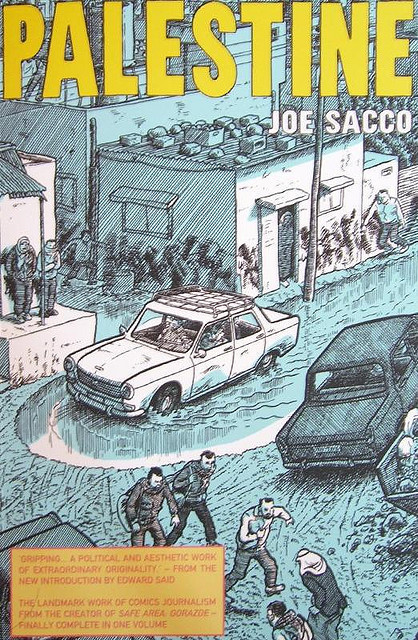
9. BLACKHOLE by Charles Burns (Kitchen Sink)
Is the story of a small town in the middle of the United States at the 70s, we follow the lives of some teenagers who run away from their homes to live in the forest, after being infected with a disease that produces horrible deformations. Without authority to guide them or a prospect of life, they relax between drugs and debauchery, in addition to being used as "the Bogeyman" for normal adolescents to behave. WHY DO YOU HAVE TO READ IT?: Black Hole is a deep analysis of life in general, but focused on adolescence, diving into the problems of socialization, self-discovery and perception of the reality that surrounds those who are in that moment of life, represented from a fictional, dark and melancholic angle, but no less concrete and real.
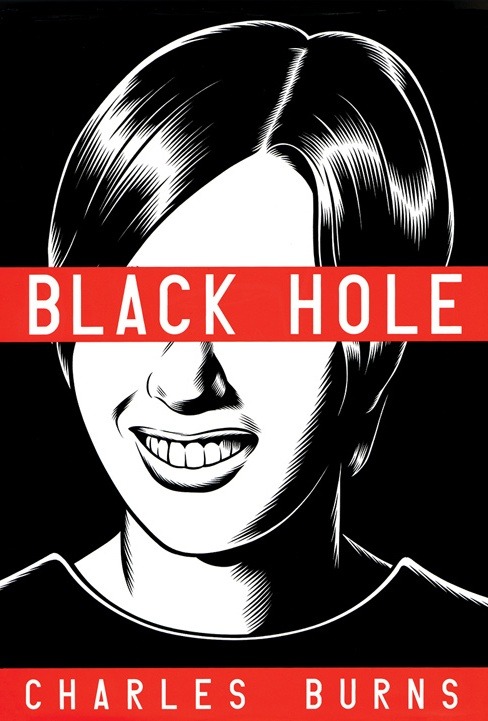
8. LOVE & ROCKETS: PALOMAR by Gilbert, Jaime and Mario Hernandez (Fantagraphics)
Love & Rockets is a cartoon of the eighties, which moves within the genre of magical realism and is developed in a world that seduces between Latin and punk, with a twist of science fiction. Palomar, specifically, is a series of stories within this world located in a Latin American city, where its people develop their daily life until they are confronted with extraordinary events. WHY DO YOU HAVE TO READ IT?: Love & Rockets is not only one of the raiders in the independent comic movement, but in addition to its captivating stories, the technique with which they are developed is unique in terms of time management. Fans of superheroes may feel out of place at first, but it does not take long until you end up identifying
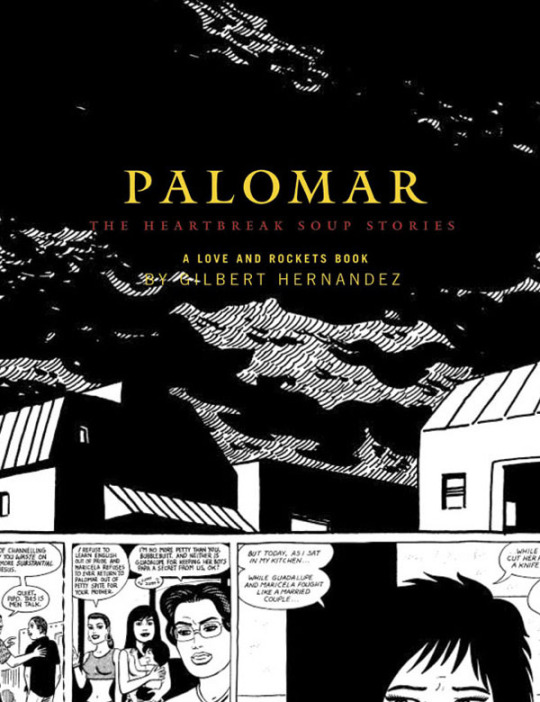
7. GHOST WORLD by Daniel Clowes (Fantagraphics)
Ghost World tells the story of two friends recently graduated from high school, who mired in the stupor of a small American town, spend their days wandering, analyzing popular culture, judging the people of their city and theorizing about their future, as the arrival of it distances them. WHY SHOULD YOU HAVE TO READ IT?: The darkness and mild bitterness of this story makes it stand out from others of the genre, thanks to his analysis of adolescence.
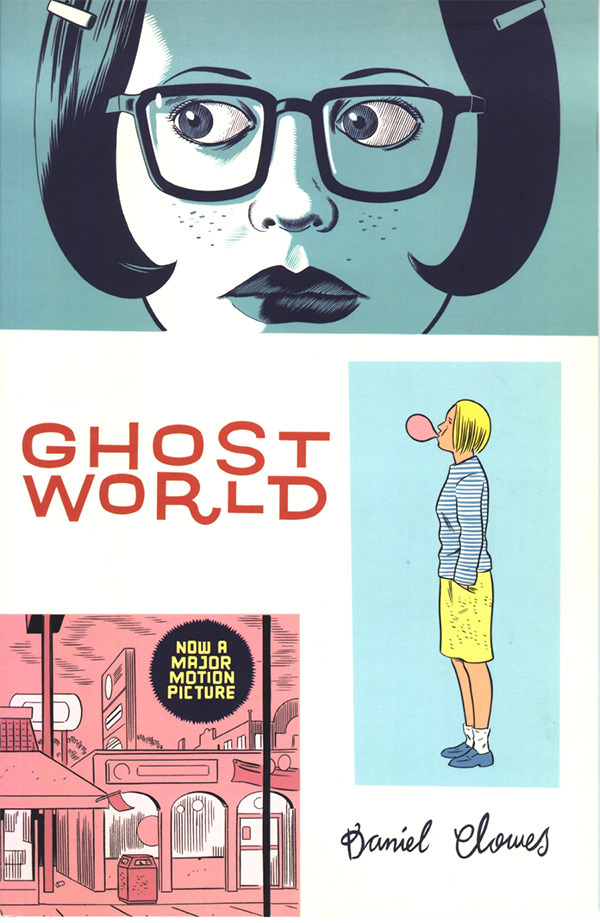
6. SEX CRIMINALS by Matt Fraction (Image Comics)
It is a comic cataloged as a sex comedy, starring a couple who stops time qhenever they reach an orgasm (more precisely during the refractory period, but that is very well explained in the story), and take advantage of this to commit thefts Sex and crimes, as the title of the collection indicates. WHY SHOULD YOU READ IT? who introduces Suzie (the protagonist) is herself speaking to the readers, playing to break the fourth wall and declaring from the beginning that this series will alter and take advantage of the possibilities offered by this medium as much as the authors can with their creativity. With this not only get the attention of the reader, but also achieve some pages with excellent composition, ways to narrate different from the traditional but used in a useful and not capricious ... and more.
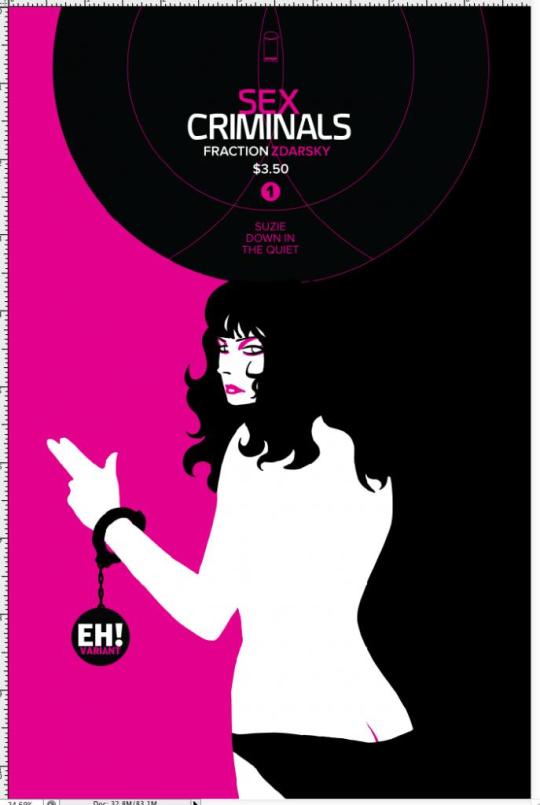
5. SECONDS by Bryan Lee O'Malley (Ballantine Books)
Katie, a 29-year-old girl who is about to take that important step of taking charge of her life now that things are going well: she is a beloved chef at the Seconds restaurant and everything goes according to plan to have her own restaurant called Katie's But a word leads to a gesture, a gesture to a moment and that moment throws you in the opposite direction towards your dreams. WHY SOULD YOU READ IT? Bryan Lee O'Malley gets a comic suitable for all audiences because despite its youthful appearance gives full on topics which sooner or later we will weigh and is to accept our mistakes and try, somehow to move forward.
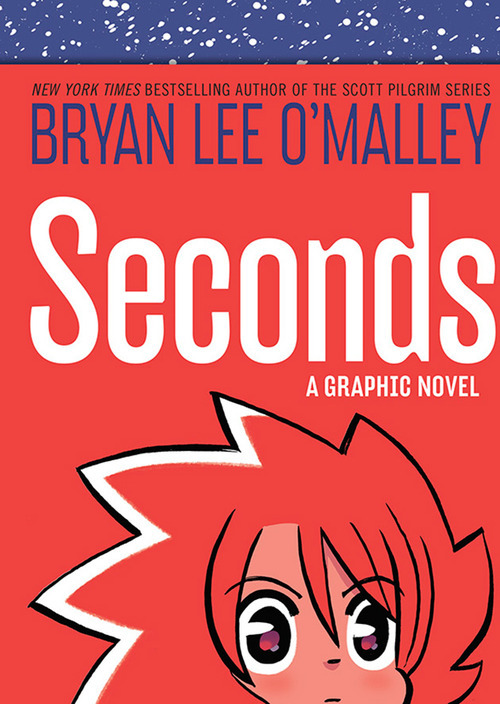
4. I KILL GIANTS by Joe Kelly (Image Comics)
Barbara is a pretty headstrong young high school girl who loves Dungeons and Dragons, dislikes school, isn't interested in friends or other people, and is obsessed with giants - more accurately, killing giants. But in our everyday world, is Barbara just a weird kid because we all know giants aren't real. Aren't they... WHY SHOULD YOU READ IT? This coming of age story is also about friendship, courage, bullies, allies, family, and the power of the imagination, this is a wonderful, touching story that should not be missed.
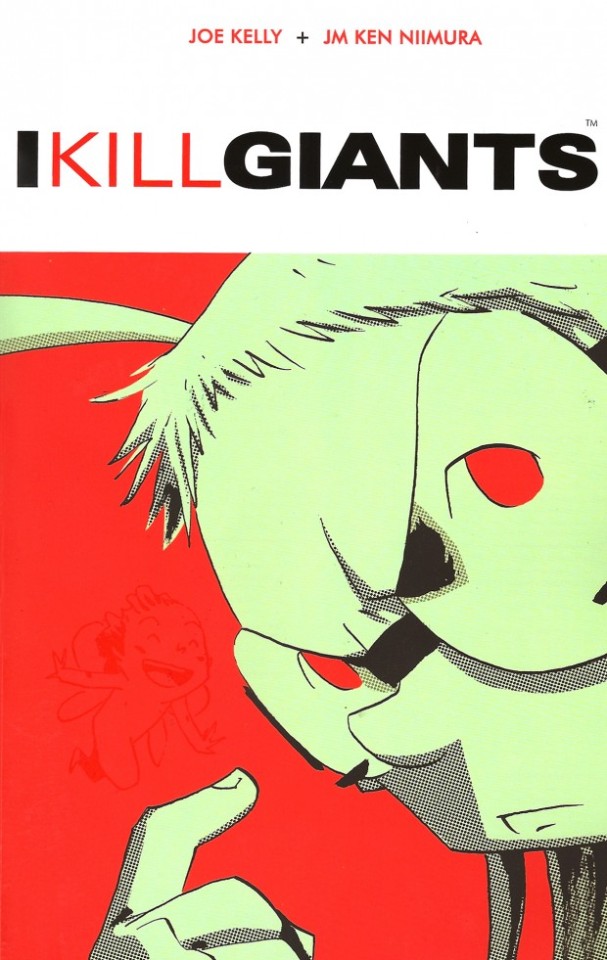
3. PERSEPOLIS by Marjane Satrapi (L'Association)
Is the autobiographical story of the Iranian Marjane Satrapi, the story of how she grew up in an Islamic fundamentalist regime that would eventually lead her to leave her country. The comic begins in 1979, when Marjane is ten years old and from her childhood perspective she witnesses a social and political change that ends more than fifty years of the reign of the Shah of Persia in Iran and gives way to an Islamic Republic. WHY SHOUL YOU READ IT? With this work, Marjane Strapi has managed to show at a stroke that the comic is capable as can be literature or cinema to reflect with crudeness the less sweet episodes of History. Persepolis is a complaint of religious fanaticism and more specifically of the repression exercised by fundamentalists against Iranian women.
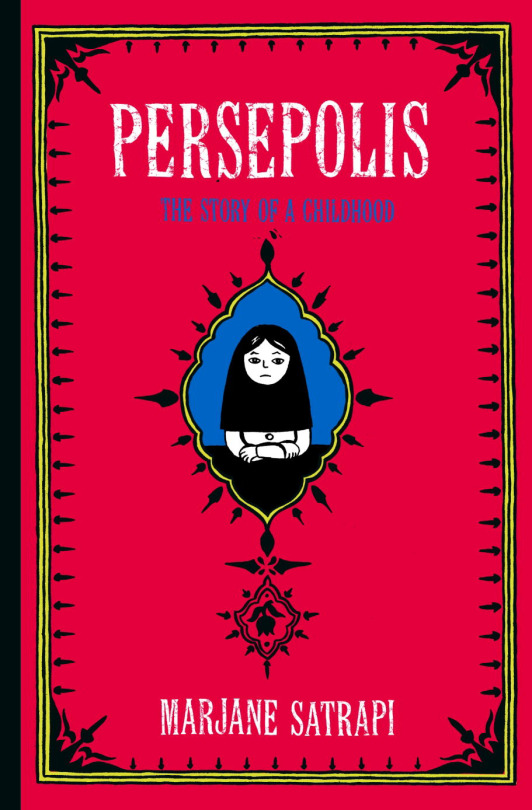
2.FROM HELL by Alan Moore (Eddie Campbell Comics/Top Shelf Productions)
From hell tells in his own way the story of Jack the Ripper. It focuses on the figure of William Gull, a magnificent doctor, first assistant of the English Royal Family. He is a doctor who is certainly respected and professional. On the other hand, it belongs to the well-regarded by the sect of The Masons. With the passage of time and the events that are spinning in their environment, something inside William breaks down. WHY SHOUL YOU READ IT? A story in which fiction and reality can not be better mixed. There are no dividing lines here. Very few people today would know how to differentiate what was truly true in everything that happened. Moore was commissioned with From Hell to provide us with his version of events. Who knows if we are not facing the best illustrations of a tragic event that marked a whole era.
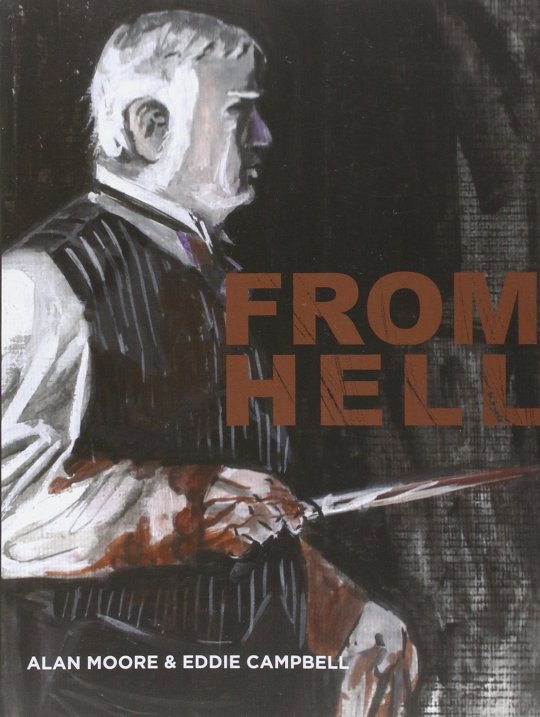
1. MAUS by Art Spiegelman (Pantheon Books)
The son of a holocaust survivor in World War II, interviews his father in order to make a story that relates his father's struggle to support his family and his sanity at the same time. Likewise, the mere fact of remembering all these events, cause father and son to be involved in so many moments of reunion and family tension. WHY DO YOU HAVE TO READ IT? Maus is not just a post-modernism clinic in comics but also must be the most accurate, sensitive and coherent human story that has ever been made in cartoon format, even after his successful decision telling everything with anthropomorphic animals, in order to alleviate a little the historical tension. At the same time, the accuracy of the historical recapitulation of the hand of a survivor and the metanarrative of the author describing the process of creating the same comic, generates this impeccable hint that won the Pulitzer Prize.
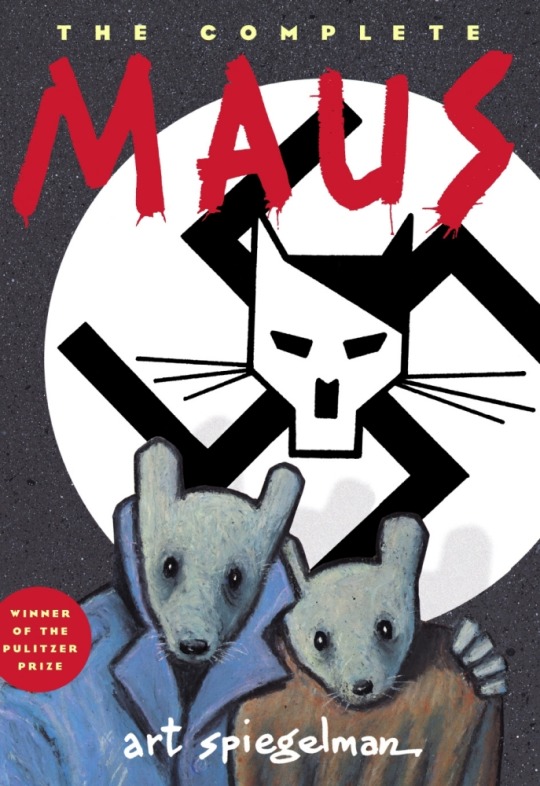
BONUS: Because there is a lot out there you should check those too. they are a good mix of art and narrative
SAGA (Is a must read)
REVIVAL
THE INCAL
BERLIN
HABIBI
#comics#independent comics#maus#From hell#persepolis#i kill giants#seconds#sex criminals#ghost world#love and rockets#blackhole#palestine#image comics#fantagraphics#kitchen sink#read comics#top 10 indie#indie comics
18 notes
·
View notes